Tommy Cash Dropped a New Single, but Who Really Gives a Shit?
Watch the new music video below.
Stay informed on our latest news!
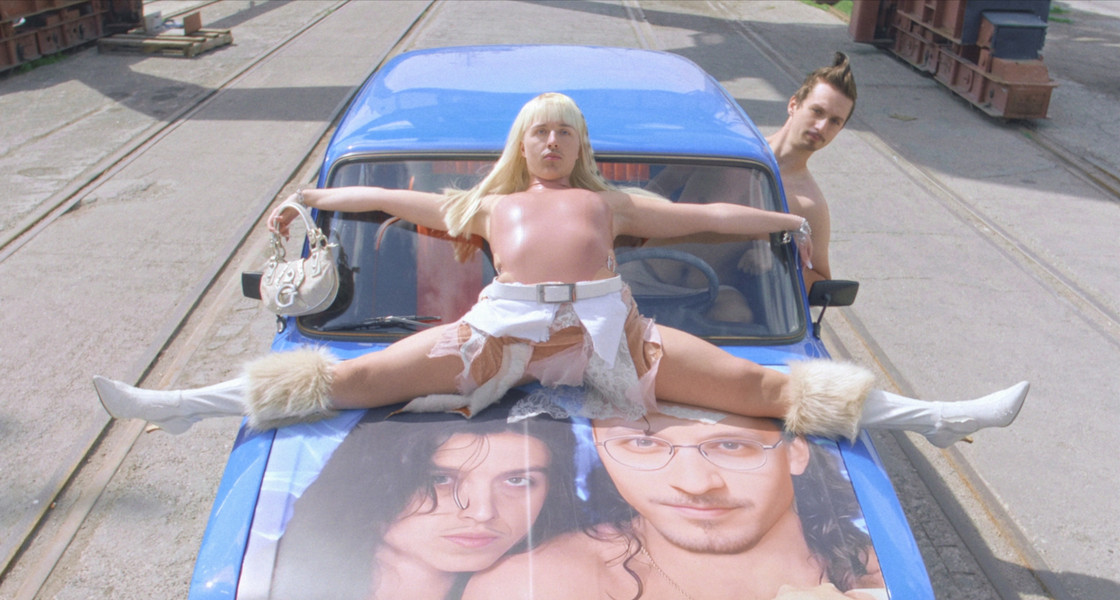
Watch the new music video below.
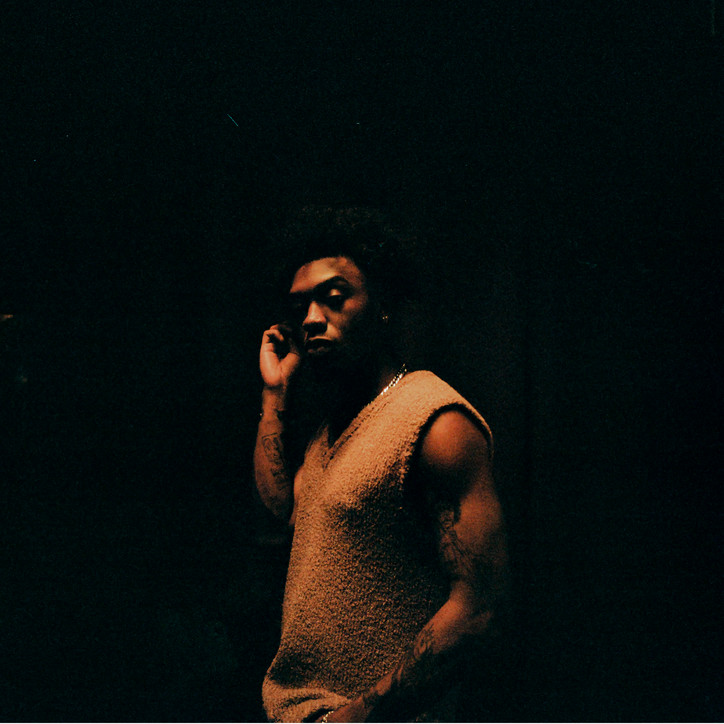
Read our exclusive interview with Shakur in which we discuss his latest project.
What inspired you to explore the theme of breakup in your new EP, it's not you, it's me? Is it more symbolic or directly related to a recent experience?
It’s definitely related to experiences in my life. I was in a toxic relationship and leaving that was hard. Finding myself after that has been a journey in itself, let alone doing it at a time when my life has been changing through music. Lastly it comes from me letting my partners know my priorities in my life, and a relationship is not one of them at the moment.
How does your new EP differ from your previous work, It'll Be Fine, in terms of musical style and lyrical content?
Production wise it’s different in terms of variety, there’s production that ranges from traditional r&b, ambient, and there’s even a bit of house/dance sprinkled in there.
Can you share some insights into the creative process behind the music video for your latest single, "Slide"?
I wanted to highlight love in the black community. We opted for showing some footage of my sold out New York show while my love interest in the video was waiting for me to get home.
Sink or swim? Pick one.
I’m a swimmer, c'mon now.
What inspired the song?
Wondering if a relationship can make it through the challenges and requirements that come with newfound fame.
Your upcoming tour, it's not you, it's me, also kicks off this month. What can fans expect from your live performances?
Energy and fun. I’ll be playing the old project (which I never toured) and the new one.
How do you balance introspection and personal growth while creating music that connects with your audience?
It’s a dance. Making music that’s true to me but can also be relatable to my audience is something that I aim for. I will always make music that comes from an organic place from me first and if fans love it, that’s the icing on top.
Can you elaborate on the sonic flourishes and vocal conjurations that make your music unique and captivating?
My sound is based on my inspirations, experiences, and where I am from. The blend of all of these make it true to me.
When you made this EP did you already have future projects in mind? Do you see your work progressing in a linear way?
This EP is a piece of a whole painting that will be seen in due time. My goal is to make my next song better than my last.
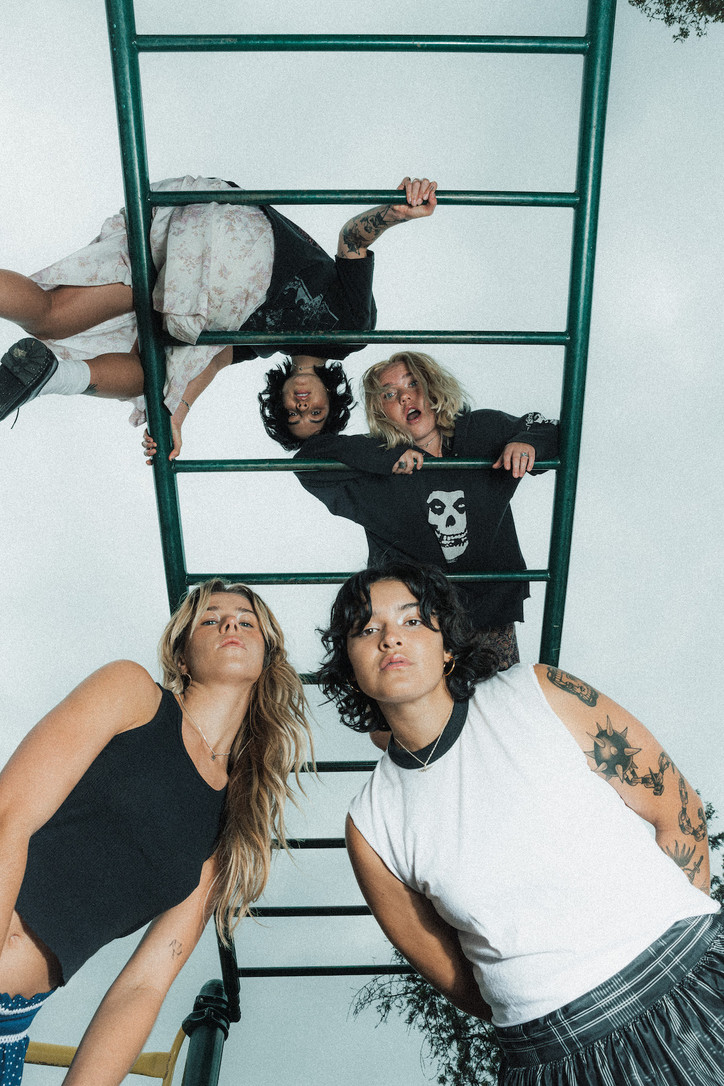
In this album, everyone tells their 14-year-old self's story, and it's one they would never change. Cristal Ramirez thinks back to her own 14-year-old self, saying, "It's her who saved me during a world on fire. It's time to tell her stories, well, more like our stories. I thought I was so much different, that I've changed... and I've worn that like a badge of honor. Ultimately, I realize that I'm that same 14-year-old girl in many ways. The difference is that I've started to like that girl a lot more than I have ever before."
We sat down with The Aces and talked hometowns, coming out, and movies that we shouldn't have watched as kids. Film reviews aside, The Aces tell the story of four girls who become eachother's family, and encourage us to find and hold whatever families we have — blood or chosen.
OFFICE— You all grew up Mormon and met in school. How did you decide to start making music together?
CRISTAL RAMIREZ— We started super young — Alisa and I are sisters and our older brother played guitar and we thought that was so cool. We were just kids, so we were watching Disney Channel and Nickelodeon, where we saw the Jonas Brothers and all young tween boy bands and we were kind of like, “we want to be the girl version of that. We want to be in a band.” It was larger than life and so cool to us, so we started playing and got really into instruments. I started playing guitar and learned how to sing, Alisa started drumming because our mom wanted us to play an instrument and we did not want to play piano. Honestly, our mom is a real one for that because it was literally mayhem. Pounding on the drums all hours of the day.
ALISA RAMIREZ— She let me set up my kit in the middle of the living room, right in front of the stand up piano and me and Cristal would just jam. She was such an amazing supporter that way.
CR—She's an incredible, incredible mom. And our dad, too, was really supportive. So we started playing together. Then Alisa and I were trying to expand our band and Ken and I have known each other since elementary school and we became really close as kids, so we were like, “Hey Ken! Play bass!” We didn't even fucking know what a bass was [laughs] we were just like, “a bass is in a band. So you should play it.”
MCKENNA PETTY— I wanted to be a bass player actually, so I was like, “Yes I wanna play bass becuase my uncle plays bass.” So that was sick.
CR— She gets a bass for Christmas, Santa comes in clutch, and a bass shows up under the tree — a First Act — probably what an $100 bass? So we start playing and learning together, and it was really fun. We started playing local — any place that would let us play as kids. Then we met Katie in junior high and Katie was super into music on her own. Her older brothers were in a local band that was really popular and she was a really great guitar player. And I always say that I was dying to pass off the guitar to someone else, because I could not — I literally knew how to play chords and I was like, “Can someone else help? I need to sing and I’m just holding down the rhythm over here. Someone else take over” [laughs]. Katie was an amazing guitar player, and in ninth grade we ended up being like, “Hey will you play guitar at this talent show?” and she’s like “Yeah, for sure.” And then she just never not played a show. I was actually just talking about this with my girlfriend and she asked, “When did Katie join your band?” And I think there was maybe one conversation where Katie was like, “Am I in the band?” and we were like “You’re in the band.” And then we just never talked about it again.
AR— I remember there being one joke about her being on probation [laughs].
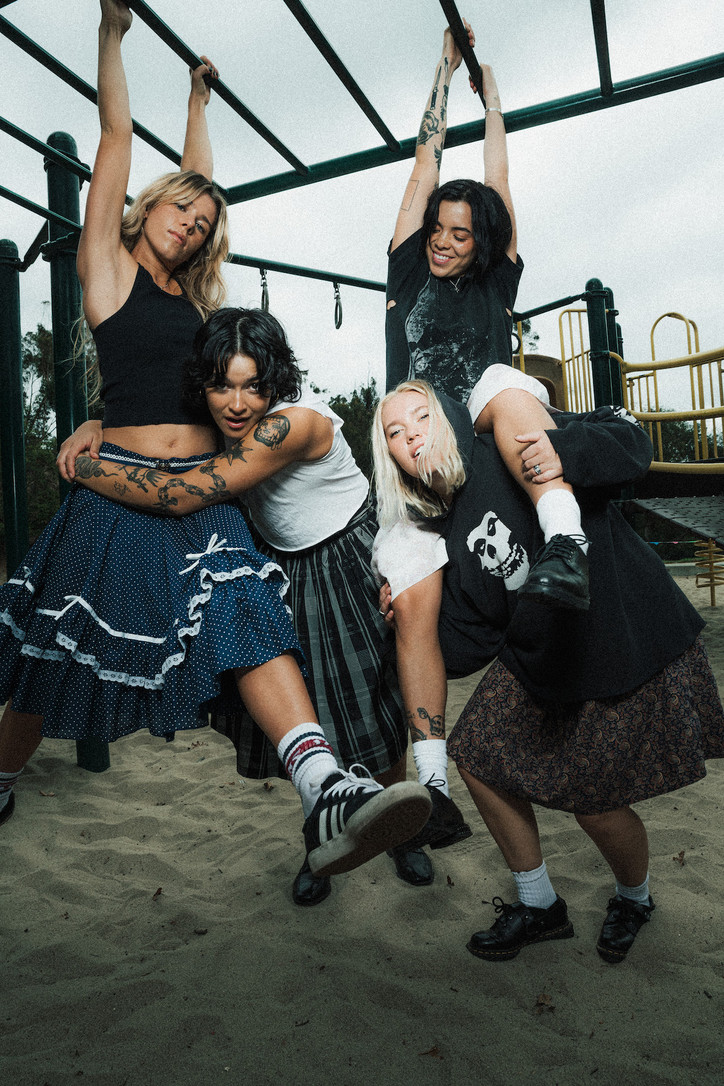
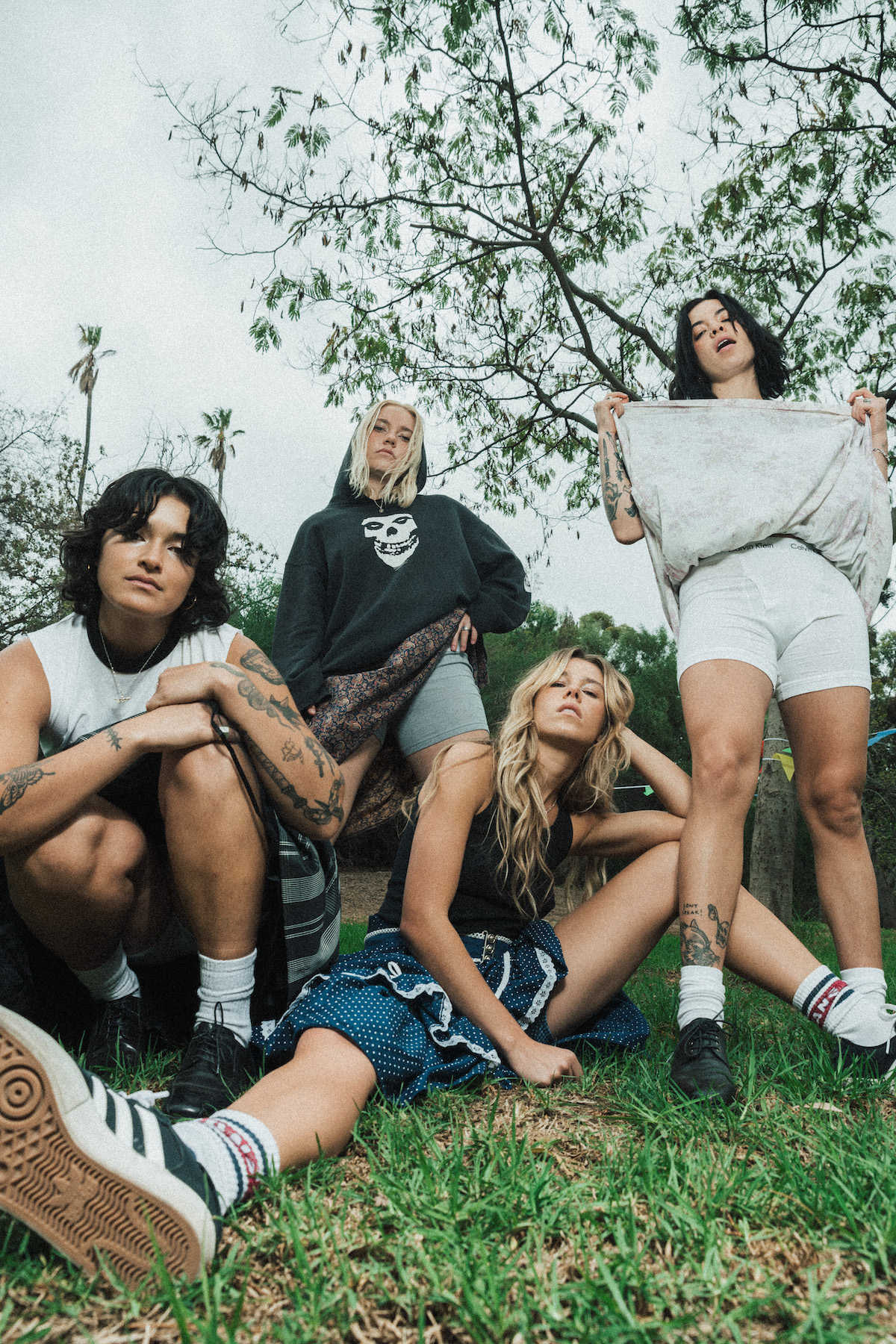
CR— It was just so natural and we had so much fun. So from ages 13 to 14, to now when we’re 27 and Alisa’s 25, we’ve been in our band pretty much our entire lives. I don’t even really remember when we weren’t in our band.
MP— We’re creeping up on 20 years. We gotta do something crazy for 20 years.
CR— It's really crazy, it’s just been a lifelong endeavor! We're 27 and 25 and we've been in a band for almost two decades, it’s insane! We just started playing together in fifth grade.
It’s tight you guys have been that close for two decades.
MP— I talked about it with so many friends outside of the band — it really is just such a rare connection that nobody really understands besides us, because it's such a magical thing that rarely happens, but I feel lucky to even just have been friends for that long.
In relation to all your past albums, how’s this work different?
AR— The album is very in line with the intention behind the record. Because we wanted to take ourselves back to those teenage years, it was important to sonically reroot in that and to go back to how we sounded as kids — as this garage band-y, rock and roll-ish sound that naturally came out of us when we were younger. We were really intentional about using a lot of analog stuff in order to kind of involve that nostalgic sound wrapped around everything, and we wanted all live drums, and Cristal was really specific about wanting to sing on a certain mic that was just a cheaper, more accessible mic to reflect that home grown-sound, so I call this phase of the record the palatting of the record, because we’re painting it and taking a moment and saying, “we have these songs, and they sound good together but now let’s really make it cohesive and beautiful and wind together, so we palatte it with these really specific guitar tones, really specific synths, and the same drum sounds throughout the entire record. And obviously each song has their own elements that differentiate them from the others, but overall this album is deeply more intentional and thorough, and I think we had a lot of fun with it, experimenting with so much equipment, trying to get that late 80s early 90s glittery, indie rock sound.
It’s a fun album — even when you’re singing quite heavy lyrics, like “these girls make me wanna die,” it’s still very light and peppy and fun.
AR— I feel like that’s very Aces, you know, where it sounds like a love song or a pop song but if you’re listening it’s like [laughs] “this shit’s sad.”
It’s like, “Are you guys ok?”
ALL— [laughs]
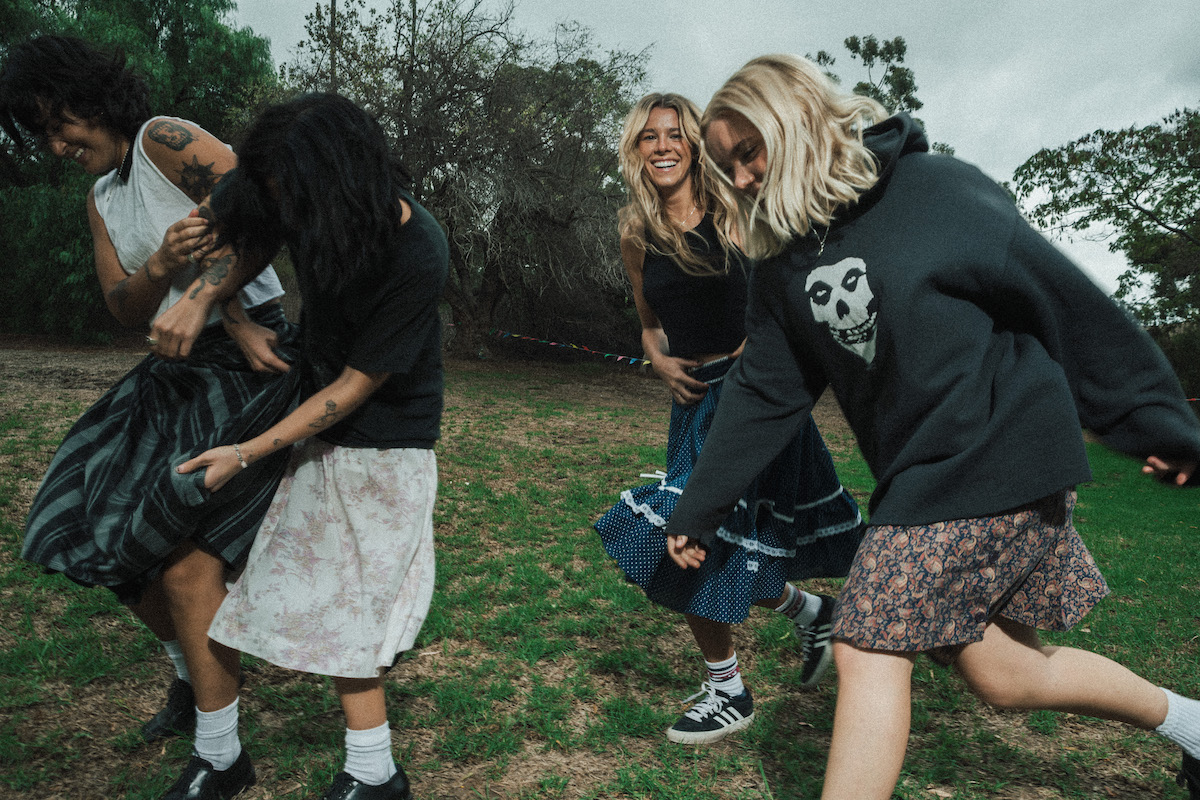
How has your music evolved?
CR— When we first started, it was just me writing for the band. And then Katie came into the band and we were writing together, and then me and Alisa were writing together, and then we all wrote together. When we signed our record deal, me and Alisa wrote a lot of music. It's always changed and flowed between us, especially on this last record. I’d say it's been the most collaborative record for all four of us in a really long time. And in the beginning, our music was really kind of punky, garage rocky, and lyrically I think we were really angsty — we were young, and I was closeted and queer and so were Katie and Alisa, and so when I look back on my lyricism from when I was a teenager, I was fascinated by love and relationships because I felt like I wasn’t going to get to experience them to the full degree that I wanted to.
MP— You wrote songs about leaving and living in a city. Remember that song that we had?
CR— Oh yeah, we had this iconic song where I was like, “my mind is in the city.” I was just so angsty as a teenager! [laughs] I wanted to get out of my hometown so bad. I wanted to get out of suburbia and create this life outside of the religious hometown we were raised in because I just so obviously felt like I didn't fit in there. And then we got out and that’s when you start discovering your queerness — such a massive part of who you are — so I think our first two records were very much about relationships and romantic love because that was the first time that I was experiencing romantic love to its fullest degree — Katie and and Alisa too. And even Ken — she got married really young and was experiencing her first real love, so there were a lot of “firsts” going on. But this third record is totally about self. It's not about other people. Even in certain songs, like “Solo,” we’re exploring relationships, but it’s not even really about the other person. It’s about how you’re showing up in the relationship, and the kinds of things that are painting you because of what you've been through. So this record is our most self-reflective record. We're really not talking about anyone else besides us and where we come from, how we grew up, how being closeted and queer in suburban Utah really has affected us in our current day life. It’s about how our struggles are still the same as when we were younger, and how getting out of your hometown doesn't really solve anything if you don't do the work to heal what you've been through. That was a really big discovery to come across during the pandemic. I was like, “Oh shit, I have so much I need to work through.” And I’ve created this life that I’ve so longed for, but there’s still so much inside of me that I need to process. So this record is our most self-aware record. Our journey has really evolved, so much like the way we’ve written music, the way we write lyrics — it changes every time we do it.
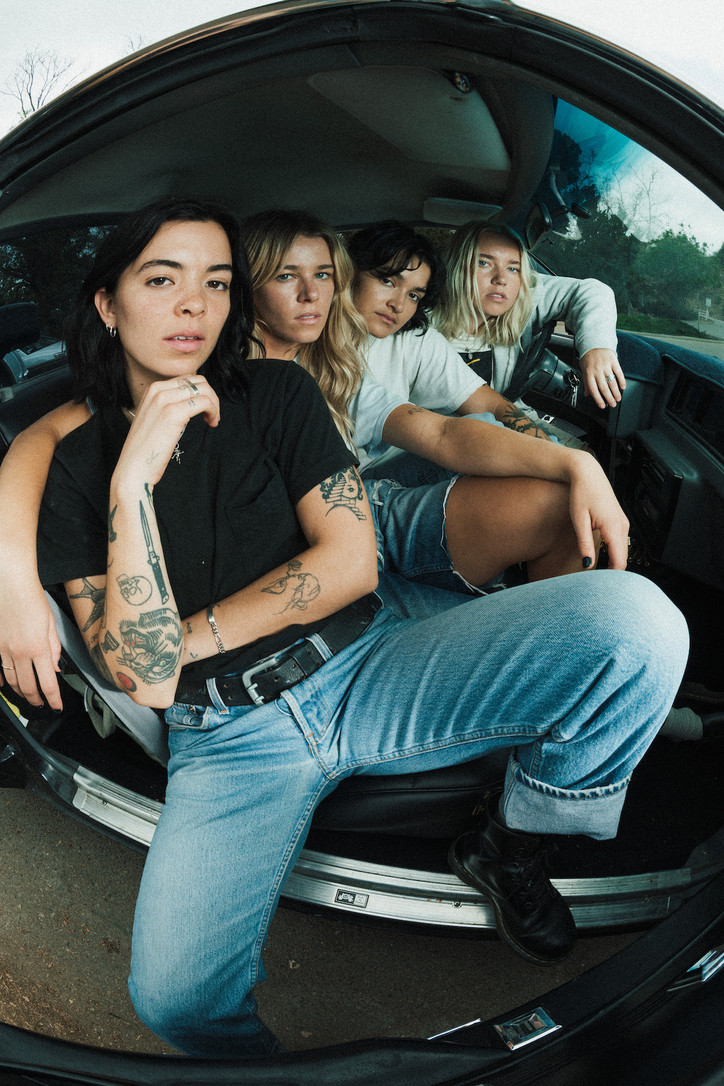
It’s good to have songs for yourself. Especially for queer and female artists, people always assume the songs you write are for other people— and for queer artists, it seems especially juicy or scandalous. They’re always asking, “Oh, who’s this song about? Is this about your girlfriend?” But I think there’s something to be said about a song can sound like a love song for someone else but really is a love song to yourself. And honestly, why isn't that what people are first thinking about? I guess a lot of people can't really understand queerness outside of the context being in a relationship, as a state of being as an individual.
CR— Yeah one hundred percent! There’s this song on the record called “Suburban Blues,” and there's a couple of lyrics about a romantic love or a crush or whatever. But most of it is about yourself and just feeling really displaced— and looking around, you realize that you just don't belong, and you don't fit into the community. There's lyric that’s like, “they all seem so happy, what am I missing? Why do I not feel fulfilled by this life that I'm supposed to be living, that’s supposed to bring me so much joy? I'm miserable and I just so desperately want to get out of here.” That in itself is like a discovery of queerness, just feeling other and different. Alisa and I are half Latina and that was something that was also very apparent to me growing up in our hometown. I didn't feel like I was at the top of the food chain when it came to anything. It was very obvious to me that I didn't look the way, act the way I should to be considered desirable. I just wasn’t the way that I was supposed to be. And so our queerness was really apparent even just through identity outside of what you're saying— romantic or sexual attraction. I just really didn't fit in, not to sound crazy and corny, but, you know. Roud peg square hole.
MP— And the relationship you have with yourself is something that's not talked about as much— like the queer identity. There are a lot of songs about queer relationships and I think that's so important too— especially Under My Influence is very much that record for us. But I love this record because it is going on that journey of Cristal’s relationship with herself and that is more important than any relationship— your relationship with yourself. And I’d never really thought about it that way.
When I listen to the album, I hear parts of it and think “Ok, this could be a love song if you interpret it that way,” but really it’s a conversation you’re having with yourself. You’re telling yourself the things you wish someone told you, because sometimes you have to be there for yourself, especially when you community isn’t there for you. I mean, I grew up Filipino and gay in suburban Ohio and I went to Catholic school, so, same shit different toilets. But to grow up in an environment like that, you have a toxic relationship with yourself and it’s exhausting. And you don’t know how to handle it, because when a lot of people write about toxic relationships and getting out of them, they’re always writing about a relationship that involves another person.
CR— A lot of the self-reflection on the album was really easy because we were later to the game. You’re experiencing kind of a queer puberty and your first loves are coming pretty much after you're able to come out, and a lot of people aren't able to come out until they're in their 20s, sometimes later. So, when you're experiencing all of these really intense emotions in relationships, it’s easy to always blame other people and to get lost. Especially when you're young, you're not as aware of who you are and what you want, so it's really easy to date and get caught up and be like, “This didn't work out because of this and this and this.” You always blame some external reason and you’re always pointing outwards. But this record is the first time where we're really thinking, “Well, I'm the only common denominator in these relationships, right? And if they all keep feeling the same, or if I am always feeling disconnected, if I'm always feeling anxious, then maybe I don't know myself well enough. Maybe it's me. Maybe I need to do some work to figure out how to be happy and fulfill myself before I'm putting all of those responsibilities on another person.” For me specifically, I’ve always been really hard on myself in my relationships, like, “Damn why do I keep repeating this pattern?” But then I'm like, “Well, I’ve had a late start to the game.” What a lot of people experienced at 16, I experienced at 22. So you just have to be really patient and kind to yourself. Because, when you’re queer, you haven’t had the ability to explore and figure out who you are, until later in life.
MP— In our culture, too, relationships are viewed as a kind of band-aid, like a quick fix that’s going to solve every issue. But ultimately, relationships with other people are just an extension of your relationship with yourself. So, until you can figure out all the shit that’s going on with yourself, you can’t really have healthy relationships with other people. But we’re not taught to think that way about romantic relationships.
Especially because we grew up with so little queer representation, we didn’t know what healthy queer relationships should look like, let alone what a healthy relationship with ourselves should look like.
CR— And in general pop culture, we have no fucking clue what healthy relationships are. We glamorize and idolize the most insane shit.
People love Sid and Nancy…
CR— And it’s insane! That would be hell on earth! A few months ago, I rewatched The Notebook, and I fucking love that movie, but that shit is so scary and toxic, like that relationship is so deeply fucked.
MP— And we would watch that on loop, we were obsessed with The Notebook when we were like ten, twelve years old, and it’s so scary. I’ve seen this whole thing going around where it’s like, “Justice for James Morrison in The Notebook! He was the healthy relationship!”
KATIE HENDERSON— When you’re a kid and you watch it you’re like, “She’s not actually in love with him! He’s the boring choice!” But no! He’s literally the stable, secure choice!
CR— With Hollywood and movies and entertainment, a healthy, stable relationship onscreen is pretty boring. It's two people who get along and coexist and are happy and content. And that's not going to sell movie tickets because it's just very normal and mundane and we are in a culture where shock factor is what sells and so we're fed this all this entertainment that’s not reflective of healthy relationships whatsoever, especially if you're queer.
I mean, when I was younger, the first piece of queer media I saw, if you can even call it that, was Blue is the Warmest Color. And I watched that middle school. I should not have been watching that in middle school!
CR— That’s a crazy, crazy start to queer media.
KH— I don’t think I’ve seen it yet.
You’ll be fine.
AR— It’s a weird fucking movie.
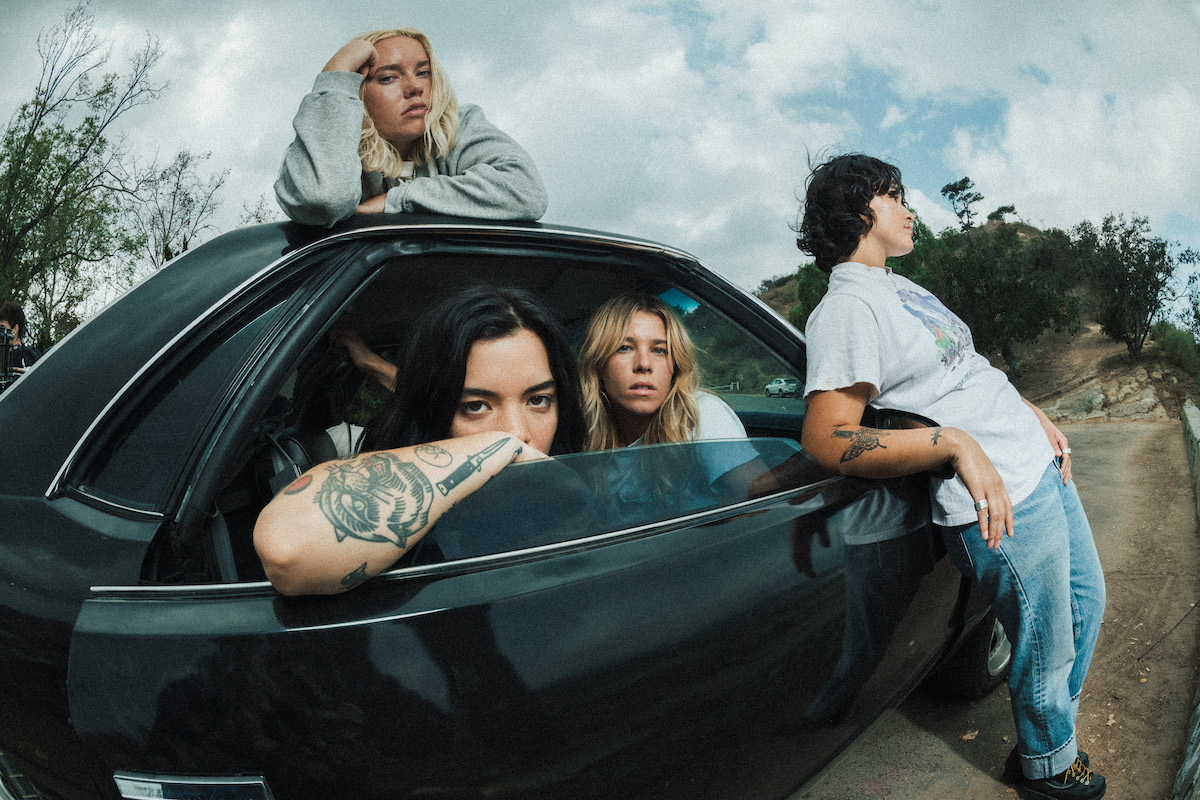
So what was it like, coming out to eachother? Was that something you had to do or was that something you all just kind of figured out?
AR— It was definitely staggered. Cristal came out to me when we were in high school — right Cris? How old were you?
CR— I was in my senior year of high school, I was about to graduate. I knew I was at crossroads with my identity, trying to figure out, “Do I want to come out? If I come out, I'm gonna part ways with the religion I've grown up in.” There was a lot to figure out at that time. I knew I wanted to tell Alisa because we’ve always been so close and she's the person I trusted the most. So I came out to her, and she was like, “Yeah, literally, me too. I'm also gay.” And I was like, “Wait, what?!” But I knew. It’s like that thing where queer people have this sixth sense. And especially as sisters, we just really shared this kind of knowing about each other. And when I look back on it, it’s the same with Katie, there was just this knowing, “Yeah, she's also queer.” And I think she knew that as well.
AR— Also, all of my best friends in high school were gay. We didn’t know when we became friends, but we just found eachother anyway. There’s something energetically that pulls us to each other. I remember when Cristal came out to me, I thought it was kind of funny, because I didn't think we had to come out to each other! I thought we already knew that about each other. I thought it was so obvious that we'd already been kind of subtly speaking in tongues becuase she always had crushes on girls, I always had crushes on girls, and we'd always talk about them, but it wasn't explicit. We’d talk about it with a “wink wink” vibe. So when she actually came out to me, she was pretty upset and emotional, but I was like, “Oh, dude! You know I’m gay too, right? I thought we knew this!” [laughs] “You don’t have to feel scared coming out to me, I’m in the exact same boat, so we can handle this together! Let’s go!” I oddly didn't have as much fear around it as I think Crystal did. I don't know why, I think I was just putting it off, thinking that it would go away. And then when it didn't go away, I was old enough to be like, “Okay, I'm down, I think I can make this work.” And then of course, later, I really fell in love with being queer. And I have an amazing queer life and queer circle, and I wouldn't want it any other way. But I just remembered that being kind of silly, charming moment in me and Cristal’s sisterhood — when she came out to me and it just ended up becoming a fun, light conversation, and we just went on our little journey together!
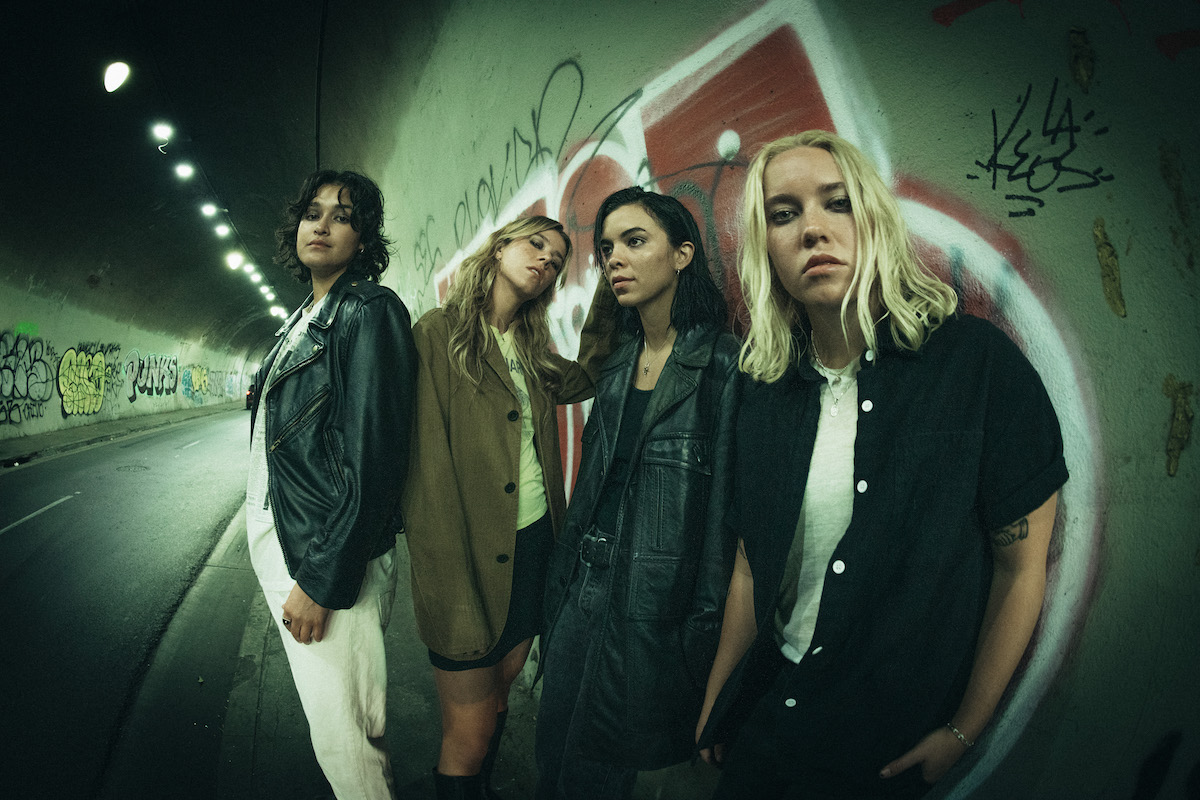
MP— Cristal, you came out to me on a road trip when we were like, 18.
CR— I was really nervous to come out to Ken. You don't know how people are gonna react, especially if they're religious, and at the time we still both kind of were. But I came out to Ken and she was just really loving and really sweet and like, “yeah, what? Of course, that doesn't change anything about our friendship,” and I was relieved. And then Katie didn’t come to us until — I mean I don’t know why but I never really came out to Katie.
KH— For Cristal and I, I fully knew she was in love with this girl and she just wouldn’t tell me and I was like, “Why? I’m also fully dating someone!” But Cristal was the first person I told, that I had been dating a girl throughout high school and hadn’t told anyone. And Cristal was the first person to be like, “Okay, tell me the truth, are you guys together?” And I was like, “yeah.” But for me, I just always knew, kind of like what Alisa was saying. I found it so funny when Cristal didn’t tell me that she was dating someone because, I know, girl! [laughs]
CR— I think it's because Katie wasn’t out either, but I knew Katie was gay. And I was wondering, “Is it going to be triggering for her?” Because we were so embedded in Mormonism, that’s how we were raised. There was a lot to lose. There was a lot of community to lose. It was really scary.
Especially when you’re young and still depending so much on your community and your parents, you ask yourself, “If they’re not cool with this, how am I gonna go to school? Where am I gonna live?”
CR— One hundred percent, but I think little by little, Katie really confided in us and came out to us probably when she was around nineteen? Twenty?
KH— Yeah probably when I was nineteen, right when I graduated highschool. And then I came out to people slowly, but I didn't really publicly come out until twenty-three, twenty-four. It was a journey. I mean I think it’s true that subconsciously, we all kind of find eachother. In high school, I was the only one of my friends who was out and then, you know, a couple years later none of us are straight.
MP— Literally all my friends are gay, so sometiems I’m like, “am I gay?” [laughs] I really am not, it’s strange!
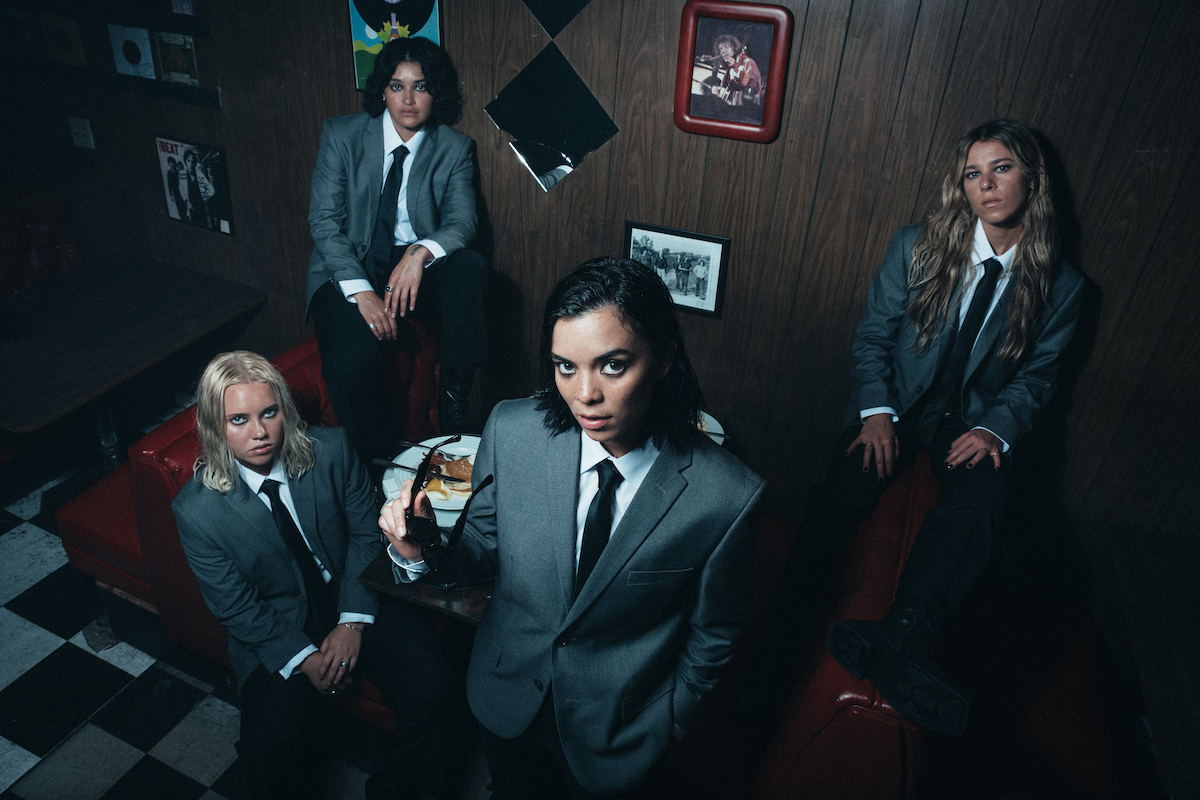
You guys were all really tight growing up, so it wasn’t any problem coming out to eachother and being yourselves around eachother. So, in your closing song, “Younger,” you say that you wouldn’t have changed anything about how you grew up. Is that still true?
AR— Yeah!
CR— I think so. Obviously, there were shitty parts of how we grew up, queer and closeted in a religion that was so intense and really traumatizing. Of course those things sucked, but I do think that those things really made us who we are and really shaped our band. Because of that pressure and intense discomfort, we were really pushed to find a voice young and stick to our band. We were really devoted because we felt like what we were doing was really important, for one, but also really life-saving for us. It really gave me hope. I would literally get out of bed because I had the girls in our band, that’s what excited me, that’s what gave me hope for my life, that’s what made me feel like I could mentally escape through my music and feel a sense of belonging and wholeness that I didn't feel anywhere else. I wouldn’t change the way we were raised. And I wouldn't change the things we went through. Because I think that it's created this really incredible thing we have together. With “Younger,” we were really intentional about ending the record on that song because it really is the summary of everything we're exploring throughout that record. It’s the reconciliation of everything.
AR— It feels like you've come to the end of this long, winding road from reflecting on your youth and realizing you're gay and yearning and being heartbroken and then accepting your queerness. And growing up and becoming adults still struggling with anxiety and depression, you see how those things are interconnected. And then you come to the end of it, and at the end of the day, despite everything I've been through, and despite everything that I didn't like about how I grew up, I wouldn't change any of it because it made me into the person I am today. And it is my story. What's so powerful about this record for us is it's us owning our story for the first time. It's us really saying this is who we are, we're not ashamed of it. We are four best friends that grew up, Mormon and closeted and we were able to break away from that and make a life for ourselves that we're proud of, and we're excited to spread that hope and that joy in a positive way, with other queer people all over the world, and that's really the sentiment of this whole record.
That’s beautiful. Do you have anything to say to your listeners who might be dealing with the same thing?
CR— That there’s hope — you know, because we live in a time where, if it feels like the community around you doesn’t support you, you can go online and find a community. When I was a teenager, there was a time when I didn’t think I’d ever be able to live authentically. But fast forward and I’m living the exact life I’ve always dreamed of. So it’s important to not lose sight of that hope and to find a community that helps you feel that hope, that makes you get up in the morning, that gives you something to look forward to, because those are the things that will get you through this time where maybe you aren’t where you want to be.

office sat down with the soulful musician between U.S. headline tour dates to discuss his latest album and what’s next on his journey.
When did you initially start getting into music and what got you into both singing and playing instruments?
I got into music when I was eight. I had a bit of a church upbringing and I feel like when you observe the musicians at church, you start to gravitate toward that community and I just wanted to be a part of that passionate community of musicians.
I imagine that is such a great community to introduce you to music. Did you start singing first or did you start playing instruments first?
I started playing the drums first, then I got to the piano and the sax, and then singing was last.
And I love how you bring that all together now with your sound. I know that in the early days of releasing music, you were doing SoundCloud releases and now years down the line, you're selling out headline tours. If you could go back and give your old self some advice, what would you tell him? Do you think that he would be proud of you now to see all the things that you're doing now?
I would probably tell myself to practice more. I think I used a little bit of time to practice back then, but I understand how important it really is today. On the note of pride, I feel like there are a lot of small wins in music and I've learned to celebrate those every step of the way. I was asking in an interview yesterday what my first ‘felt famous moment’ was. And I was saying 'Love Be Like,' which is a song from SoundCloud — and that's when I felt famous. But then, of course, it gets outdone by 'Girls Who Dance' or 'Tadow,' but I'm still thankful for all those small wins. So yeah, I definitely feel proud. But I definitely should have practiced more.
After the traction that occurred on SoundCloud, your debut project cemented your sound, which you've labeled “TrapHouseJazz.” You really created and continue to maintain your own lane. Is that something that's essential to you in your music-making process? Do you appreciate sounds or the types of music that can't truly be boxed into one category?
Yeah, I feel like TrapHouseJazz represents an approach to music and a lot of genre-combining elements. And I think it's all about showing people that there are different types of music around the world and there's a throughline in those sounds. A lot of it originates from Black culture. I have such a deep root in Caribbean culture and African culture and that's some of the stuff that I use to kind of bridge the gap between all these different genres and countries. So Traphousejazz represented that from the get-go.
You bring together so many different elements based on your upbringing, different things you're inspired by, and such. I know you also recently released a new self-titled album, and you've been revered for your ability to shapeshift sonically. This body of work displays that same dynamic craft, but it's been a little more precisely fine-tuned. In what ways is this most recent project a symbol of your evolution through time as an artist but also just as a person?
I think this one's about the narrative and the songwriting, first and foremost. So I think the vulnerability on this album is what makes it different from the other body’s work I'm known for. It kind of speaks to bringing all of the different elements of Masego together and, again, telling that story that can make sense of the many influences and I guess just the many ways that I've been understood by my audiences.
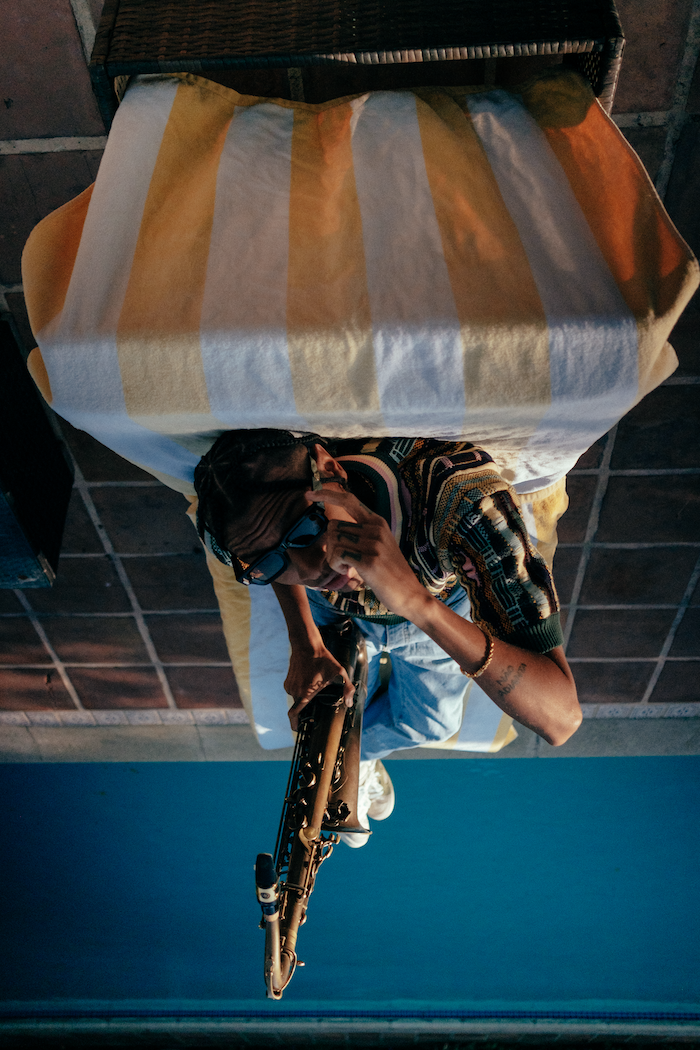
I want to get into the specifics of the album. Do you have a favorite track from it or a story that goes along with that? And as a follow-up, how do you want that track to make listeners feel when they hear it?
I like ‘Black Anime’ — both literally and metaphorically. I think that song is the best intro for that story because of the whimsical, dreamlike element of the album. And just my thought process and my approach. I just feel like there's not enough Black anime, but there's such an inspirational aspect about seeing different shades, different environments, and different architectures created through that canvas and that medium. And I feel the same way that it's rare to see Black African-American anime, it's rare to see a saxophone player playing with the instrumentation that I do. My approach to jazz is really this outlier type of approach. And so when people hear that, it's storytelling, it's whimsical, it has all those magical elements that I want people to feel.
Totally. That ties really neatly into what I wanted to speak about next, which is inspiration. I know that anime is a really big source of creative inspiration for you. You've discussed the fact that Miyazaki is your favorite director when it comes to anime and that entire culture inspires your craft heavily. What would an anime about you be called and what would the plot entail?
I don't know the name yet, but I know it would definitely be about the almost supernatural elements of sound and music. Maybe similar to how My Hero Academia normalized superpowers being in regular society. I would take the same approach to musical instruments, probably. And the name, I think it would come randomly.
Would you rather be a villain or the quintessential hero?
I'd rather be the villain. Because I think it's all about perspective. Most villains think they are the hero, so I'd prefer that.
Along with being an anime fan, something else that I picked up through research on you is that you are also a Gemini. Does that inform your music or your creative tendencies in any distinct ways?
I think there's a similarity between a lot of Geminis, you know, Tupac, Biggie, Andre, Prince Kendrick. There's a lot of creativity in us. A lot of duality. A lot of eclectic-ness. So I fall in line with that, for sure.
I think your sound is really colorful. It kind of conjures so many diverse images and I feel like your fashion tendencies sometimes reflect that. How would you describe your personal style? And in what ways do you feel like the things you wear help bolster the message that you want to send through your music?
I think my style is just Afro-Caribbean. I take a lot of pride in showing people that any high-end luxury brand that you like, you can trace back to what African tribe or print they got it from. And I just go back to the source and just wear that, you know what I mean? Like literally anything that somebody thinks is cool came from Africa in some way. So Afro-Caribbean — I'm Jamaican — and I feel like Jamaicans historically are West Africans. And so it all comes back to that same source of cool. I like doing that. And I feel like when you put on clothes, you allow yourself to embrace whatever the spirit of those threads and materials are, and I just let that happen.
And I feel like it creates this throughline in connection to your sound as well. Some of your songs like 'Yams' and 'Tadow' have also taken the internet by storm. This is something that I've been interested in hearing artists' perspectives on, especially with the current way that the music industry is evolving. How do you navigate this modern music realm, which now is often motivated by social media and the internet? Do you feel like social media has been beneficial to your craft?
For sure. You know, social media is a wild west that always allows you to be impressed by what people gravitate to in droves. You can't really predict what people will choose or what will kind of catch a trend. And I think that element sort of levels out the playing field in a way. It played a big role in my career, especially because I came up on the internet, so I'm not a stranger to it. I've been on all the platforms and done all the things. So I think it's good to sow a lot of seeds into those platforms and then reap something later on.
It definitely creates this whole world of allowing people to access things that maybe they wouldn't have come across on their own. You've amassed Grammy nominations, you've produced for Drake, and you started your own cafe business in Brazil. Can you tell me a little bit more about that business and the process of starting that and what that means to you?
I'm all about community and I think there are certain locations that garner a great community. There are barbershops, there are restaurants, there are parks and things of that nature. So I'm working on a space that is a cafe to be one of those community hubs. So, of course, granting healthy food to the community, but creating a place for black people to meet up and give access in a place that doesn't give access to people of color in that way. It just is what it is. And in America, we hide it really cute, but overseas it's very apparent who's doing better in life. And I want to kind of balance that out a little bit because they've affected me a lot and there's a lot of Jamaicans and culture that I'm very familiar with in Brazil. So I just like being out there, from that perspective. And it's very black. Salvador Bay is very black and I like to be around black places.
That's a really compassionate outlook to have — and now you get to create that community for other people. I think it adds another element to your artistry as well. There is a consistency that I'm starting to see between the community you create in your music and the community you aim to create even outside of that. On that note, there are so many things that you've gotten to do with the platform that you now have. Are there any other things that you hope to accomplish in the coming years that maybe you haven't?
I just want to be a better leader for my team, that's all. Because I think the wins feel even better when the journey is smooth. And I think it comes back down to me — if I'm good to go in every aspect from my intellect to my health, I think everybody around me is going to love that. And so I'm just working on myself so I can make sure people around me are doing well.